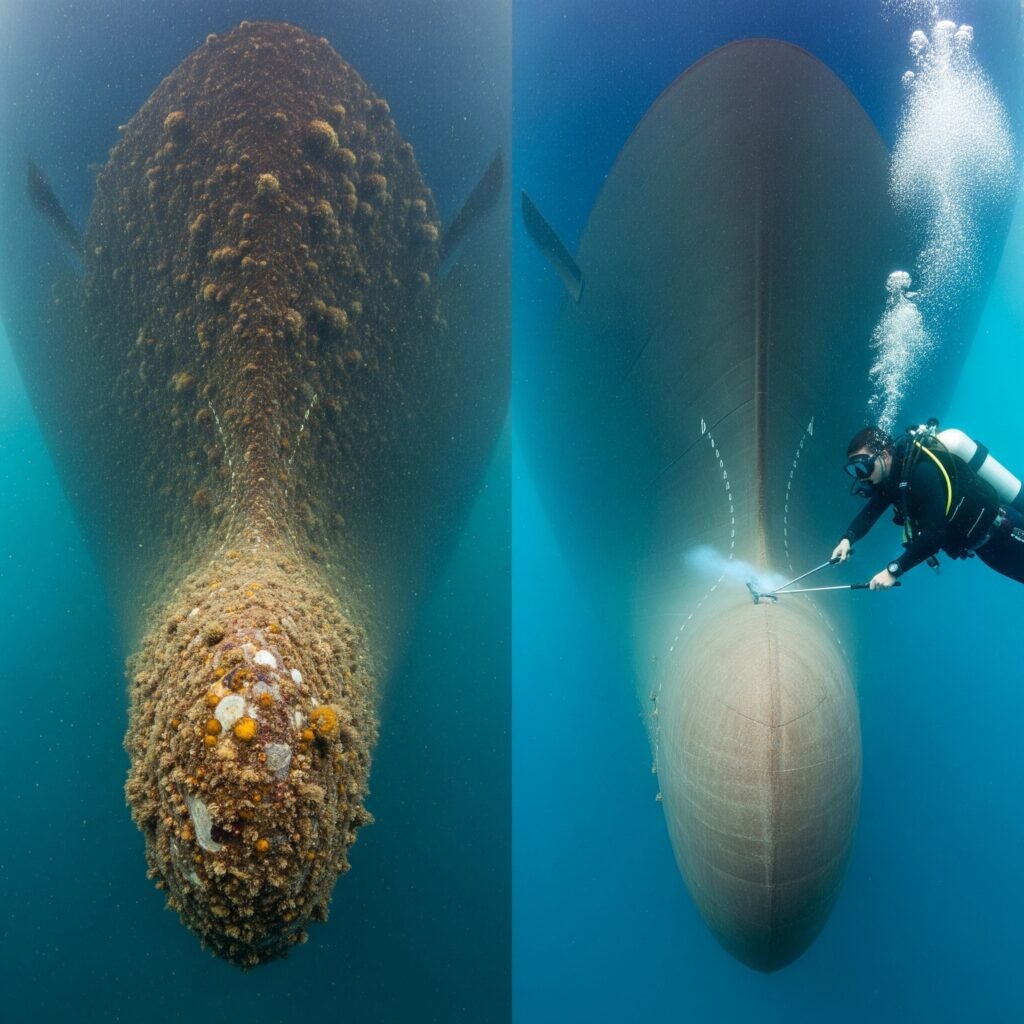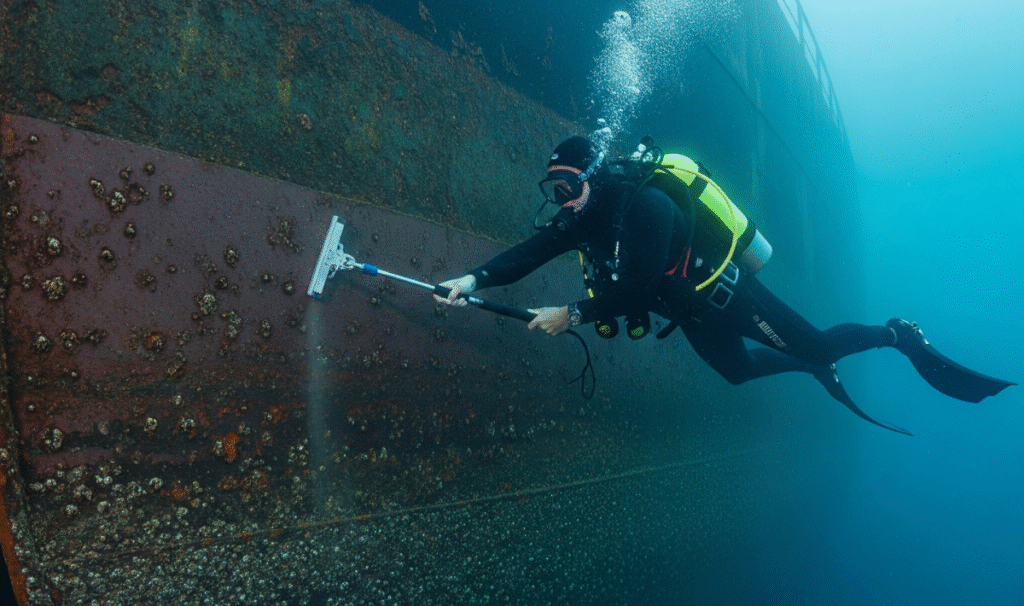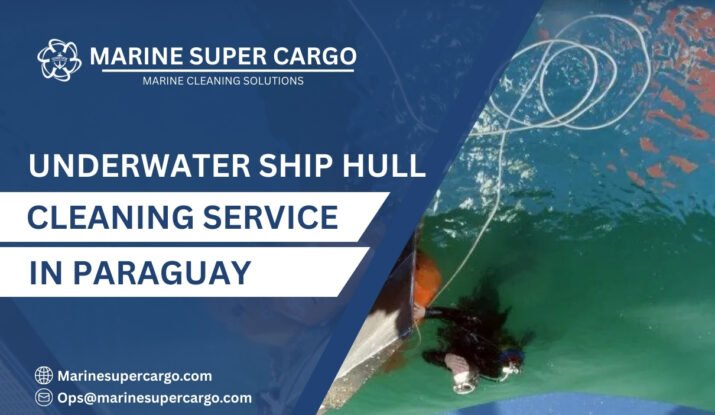Paraguay is unique. Despite being a landlocked country, it’s deeply connected to global shipping routes. How? Through its arteries of water—the mighty Paraguay–Paraná Waterway. Stretching thousands of kilometers, this river system links Paraguay to Argentina, Brazil, and ultimately to the Atlantic Ocean.
Barges and cargo vessels transport everything from soybeans to minerals through these waters, fueling the nation’s economy. But just like ocean-going ships, these inland vessels face a persistent challenge: biofouling.
And that’s why underwater ship hull cleaning in Paraguay is more important than many realize. It’s not just about appearances; it’s about cutting costs, extending vessel life, and protecting ecosystems.
So, let’s dive into the underwater ship hull cleaning in Paraguay and why it’s a wise investment for every shipowner and operator along the inland waterway.
What is Underwater Ship Hull Cleaning in Paraguay?
Biofouling is the attachment of algae, mussels, and other organisms to the underside of ships. For vessels on rivers, this accumulation happens faster due to nutrient-rich freshwater. The result? Drag, higher fuel use, and reduced efficiency.
Underwater hull cleaning is the process of removing these organisms. In Paraguay, divers perform cleaning with specialized brushes, scrapers, and eco-friendly suction tools. Underwater ship hull cleaning in Paraguay is becoming essential as inland shipping plays an ever-bigger role in the national and regional economy.
Fuel Efficiency and Operational Savings
Drag from Biofouling on Inland Vessels
Imagine trying to row a canoe with a fishing net tied to its base—the resistance makes every stroke harder. That’s what biofouling does to barges and river vessels. It increases drag, meaning engines need more fuel to push the same loads.

Fuel and Speed Advantages of a Clean Hull
Clean hulls streamline performance. By investing in underwater ship hull cleaning in Paraguay, operators reduce drag, cut daily fuel bills, and improve turnaround times. For barge operators carrying bulk cargo like soy exports, these savings stack up quickly.
Corrosion Risks in River Conditions
River environments may seem less damaging than saltwater, but fresh and brackish conditions also accelerate hull deterioration. Organisms cling, coatings break down, and corrosion quietly eats away at steel structures.
Scheduled underwater ship hull cleaning in Paraguay prevents corrosion, protects coatings, and extends vessels’ working lives. That means fewer costly dry docks and fewer mid-operation failures.
Ensuring Compliance with Global Safety Standards
Even inland water vessels eventually connect with seaports governed by the IMO and global maritime regulations. A fouled hull can raise red flags at inspections under MARPOL guidelines. By maintaining clean hulls, Paraguay-based operators ensure compliance and reduce risks of international delays.
Cutting Emissions for a Cleaner Waterway
Fuel efficiency doesn’t just save money—it reduces emissions too. The IMO estimates that shipping accounts for nearly 3% of global greenhouse gases. Cleaner hulls require less fuel, making underwater ship hull cleaning in Paraguay a green investment that lowers carbon footprints across river systems.
Preventing Invasive Freshwater Species
The MARPOL Convention highlights invasive species as a global risk. When biofouling accumulates, it can transport non-native species across ecosystems. In the Paraguay–Paraná Waterway, invasive mollusks could devastate local fisheries. Hull cleaning stops the spread, protecting biodiversity.
Role of Barges in Export Logistics
Paraguay relies on its rivers to export key commodities. Barges are the backbone of this trade. But when biofouling slows or damages barges, entire supply chains—from soy exports to petroleum imports—get disrupted.
Underwater ship hull cleaning in Paraguay ensures trade efficiency, timely deliveries, and reduced logistic costs, supporting national economic stability.
Strategic Position Linked to Global Trade
Because the Paraguay–Paraná River connects to the Atlantic via Buenos Aires, every locally operated vessel ties into global supply chains. Hull maintenance here isn’t just a local requirement—it’s an international necessity.
Guidance from IMO and MARPOL
Although Paraguay doesn’t sit on an ocean, it is still part of the global maritime system. The IMO and MARPOL regulations require efficient and eco-conscious operation of all vessels, including inland ships.
Underwater ship hull cleaning in Paraguay helps operators keep vessels compliant, clean, and environmentally responsible across borders.
Best Practices from IMCA and IAPH
Global bodies like imca-int.com and iaphworldports.org stress eco-friendly hull-cleaning techniques—like debris capture systems. Paraguay’s maritime sector increasingly incorporates these standards for safer inland cleaning operations.
How Underwater Hull Cleaning Works in an Inland Context
Step-by-Step Protocol
- Inspection – Divers check fouling buildup under barges or river vessels.
- Cleaning – Brushes, scrapers, or cavitation jets carefully strip fouling.
- Polishing – Smoothening surfaces restores movement efficiency.
- Debris Capture – Ensuring invasive species or organisms are not released back into the river.
- Final Verification – Maintenance records shared for operator compliance.
Tools and Techniques Used in Paraguay
Divers in Paraguay often rely on adaptable tools suited for shallow or murky river water. Eco-friendly suction systems and portable ROVs (remotely operated vehicles) are being adopted for precision hull cleaning.
Rapid Fouling in Freshwater Conditions
Tropical and subtropical climates along the Paraguay River system accelerate fouling. Organisms attach faster than in colder waters, making cleaning a recurring necessity.
Balancing Frequency, Costs, and Downtime
Operators must weigh cleaning costs against downtime. Too frequent cleaning risks coating wear, while delays skyrocket fuel burn. Optimal practice? Schedule underwater ship hull cleaning in Paraguay every 6–12 months, balancing efficiency with savings.

Eco-Friendly Coatings and River-Safe Tools
Emerging eco-friendly antifouling paints and redesigned brushes safe for inland ecosystems will minimize fouling without harming biodiversity.
Use of Digital Monitoring and Robotics
Expect smart sensors and AI to monitor hull performance in real time. Autonomous underwater drones may soon handle underwater ship hull cleaning in Paraguay, lowering risks to divers and improving precision.
Conclusion
Even in a landlocked nation like Paraguay, hull cleaning plays a vital role. Rivers are the lifelines of trade, and fouled hulls quickly reduce efficiency, safety, and sustainability. The benefits of underwater ship hull cleaning in Paraguay are clear:
- Major savings in fuel and operational costs.
- Enhanced safety, durability, and compliance for vessels.
- Stronger environmental protection in inland waterways.
For ship operators navigating Paraguay’s rivers, hull cleaning is not an afterthought—it’s essential. By partnering with trusted professionals like CleanShip.co, operators ensure efficient, safe, and sustainable river trade.
FAQ:
Q1. How often should underwater hull cleaning be performed in Paraguay?
Every 6–12 months, though tropical biofouling may demand shorter cycles.
Q2. Is riverine hull cleaning different from ocean cleaning?
Yes. Inland cleaning requires specialized tools adapted for shallow, murky, nutrient-rich waters.
Q3. Does hull cleaning reduce costs for barge operators?
Absolutely. Less drag means lower fuel bills and longer vessel lifespans.
Q4. How does hull cleaning help prevent invasive species in Paraguay?
By removing organisms before vessels transit between river systems, the ecological threat of invasives.
Q5. Why is hull cleaning strategic for Paraguay’s exports?
Because barges are central to commodity trade, underwater ship hull cleaning in Paraguay ensures they operate at maximum efficiency.


